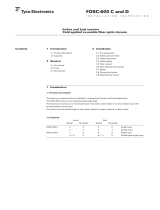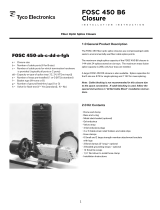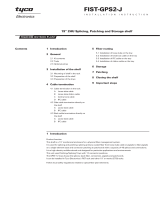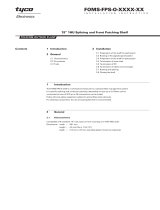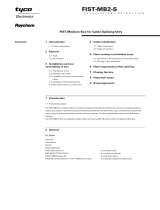Page is loading ...

FOSC-450D
INSTALLATION INSTRUCTION
Fiber Optic Splice Closure
1 Introduction
2 General
2.1 Kit content
2.2 Tools
2.3 Accessories
2.4 Capacity
3 Preparation of the closure
4 Cable preparation
4.1 Looped cable
4.2 Drop cable
5 Cable termination
6 Fiber routing
6.1 Fiber routing to the basket
6.2 Fiber routing to the tray
6.3 Fiber routing on the tray
7 Installation of the gel block
8 Grounding
9 Closing the closure
Content
1 Introduction
The FOSC-450 is an environmentally sealed enclosure for the fiber management system that provides the function
of splicing in the external network.
The FOSC-450 has provision for all cable terminations and sealing requirements.
The closure is a single ended design made of a thermoplastic material. The base and dome are sealed with
a clamp and O-ring system. For cable sealing , a wrap-around block with 6 ports is used that contains a pre-
installed gel profile. One can terminate 6 cables, with a diameter of minimum 9 mm and maximum 25 mm.
It can be opened and closed repeatedly without replacing or changing components.
TC-761-IP
Rev A, Feb 2017
www.commscope.com

Note: slide the base over all the cables! In case of looped cable:
remove the outer jacket first (4.1).
4 Cable preparation
2
2 General
2.1 Kit content 3.1 Open the clamp and remove the dome.
3 Preparation of the closure
• Dome
• Base O-ring system
• Cable attachment plate with tower
• Gel block with trigger
• Clamp
• 2 cable retention devices
• 4 plugs for unused ports
• Silicagel
• Installation instruction
• Spacer
2.2 Tools
FACC-TUBE-STRIPPER-03 to strip loose tube
2.3 Accessories
Cable termination kit See ordering guide
FOSC-D tray 36, 48, 72 or 96
FOSC-D tray Ribbon 24
FOSC-450-MULTI-4/7
2.4 Capacity
Single tray: max. 6 with basket
Ribbon tray: max. 3 with basket
3.2 Position and secure the closure tower properly to the work
station.
3.3 Cable entrance positions.
Looped cable only entrance ports 5 and 6.
1
5
34
2
6

4.1 Looped cable
Loose tube cable
4.2 Drop cable
Loose tube cable
3
4.1.2 Make a window cut of 4.2 m, cut away the strength member
at a distance of 65 mm from the outer jacket. Cut the inner jacket at
100 mm from the outer jacket. For looped cable install the cables in
ports 5 and 6 for proper routing to the tray.
Central core cable
4.1.1 Make a window cut of 3.5 m. Cut the strength member at a
distance of 70 mm.
30 mm
65 mm
100 mm
Central core cable
4.2.2 Remove the jacket over a length of 1.4 m, cut the strength
members at a distance of 65 mm from the outer jacket. Cut the inner
jacket at 100 mm from the outer jacket.
4.2.1 Remove the jacket over a length of 1.4 m, cut the strength
member at a distance of 70 mm from the outer jacket.
30 mm
65 mm
100 mm
5 Cable termination
Loose tube cable
5.1 Install the strength member termination plate.
5.2 Install the cable retention device on the cable, tighten the hose
clamp.
5.3 Slide the cable retention device in the cable termination plate.

4
5.5 Install the strength member in the termination plate.
Central core cable
5.4 In case of two strength members, first bend the central plate
backwards.
5.7 Slide the cable retention device in the cable termination plate.
5.6 Install the cable retention device on the cable, tighten the hose
clamp.
6.1.1 Install the looped cable in ports 5 and 6 for proper routing to
the basket of the tray.
6 Fiber routing
6.1 Fiber routing to the basket
Loose tube
6.1.2 Secure the loop onto the basket with tie-wraps.

5
Central core
6.1.3 Install the spiral tube of 200 mm on the cable. Fix the spiral
tube with the foame on the basket.
6.1.4 Keep the bare fibers in place using tie-wraps.
6.2 Fiber routing to the tray
6.2.1 Select a tube and strip the loose tube up to 200 mm from the
outer cable jacket.
6.2.2 Install a transportation tube over the fibers and the loose tube.

6
6.2.3 Cut off the excess length of the transportation tube and secure
with tie wraps on the tray.
6.2.4 In case of central core route a transportation tube from the
basket behind the tower to the tray.
6.2.5 Inter tray jumping.
Route the transportation tube from the bottom tray, behind the tower,
over the already installed loose tubes to the allocated tray.
6.2.6 The tray can be blocked with the tray wedge. Turn the
wedge to the shown position.
6.3.1 For single fiber.
6.3 Fiber routing on the tray
A Single fiber

7
6.3.2 How to use fiber aligner.
In case of
6R12 - Bend all plates inside the aligner and position 1-6 ribbon 12
next to them as shown at drawing 1.
12R12 - First remove plate and bend the two remaining plates into the
aligner. Position the 7-12 ribbon 12 next to them as shown at drawing 2.
18R12 - Remove plate 1 and 2, bend plate 3 into the aligner. Position
the 13-18 ribbon 12 next to the plate as shown at drawing 3.
24R12 - Remove all plates and place 19-24 ribbon 12 as shown at
drawing 4.
R24 - Remove all plates and place maximum 12 ribbon 24 as shown
at drawing 5.
B Ribbon fiber
1 - 6xR12
7 - 12xR12
(X cut away)
13 - 18xR12
(X cut away)
19 - 24xR12
(X cut away)
Max. - 12xR24
(X cut away)
6.3.3 Cut the appropriate number of plates.
6.3.4 Bend the remaining plates to the inside and click them into the
slot.
6.3.5 Place the ribbon bundle into the ribbon aligner and close it.

8
6.3..7 Install the aligner into the tray.
6.3.6 Push the ribbon aligner into the spiral tube. A Old termination plate with lockers
7.2 Position the open gel block between the cables.
Leave ± 20 mm between the gel block and the cable attachment plate
by using the spacer.
7.1 Remove the protection foil from the gel block and open the gel
block.
7 Installation of the gel block

9
9 Closing the closure
9.1 Place the hook and loop fastener around the trays and basket,
with the hook and loop fastener eye on top of the trays. Silicagel can
be placed underneath.
9.2 Slide the base over the Gel block and insert the frame into the
base (check proper position).
8 Grounding
8.1 In case of grounding, mount grounding wire on the grouding
bolt.
B New termination plate
7.3 Position the open block between the cables.
9.3 Insert the plugs in the unused ports.
Remark: when installing the plugs be sure not to bend the crowns in the
gel block.
9.4 Tighten the trigger until it butts. If necessary, use wrench to
tighten the trigger.

10
9.5 Place the O-ring back on a clean base.
9.6 Slide the dome onto the base. Make sure that the arrows
match. Use the clamp to seal dome and base.
9.7 Close the clamp.

11

© 2017 CommScope, Inc. All rights reserved.
FOSC and all trademarks identified by ® or ™ are registered trademarks or trademarks, respectively, of CommScope, Inc.
This document is for planning purposes only and is not intended to modify or supplement any specifications or warranties relating to
CommScope products or services.
This product is covered by one ore more U.S. patents or their foreign equivalents. For patents, see:
www.commscope.com/ProductPatent/ProductPatent.aspx.
To find out more about CommScope® products, visit us on the
web at www.commscope.com
For technical assistance, customer service, or to report any
missing/damaged parts, visit us at:
http://www.commscope.com/SupportCenter
1/12
